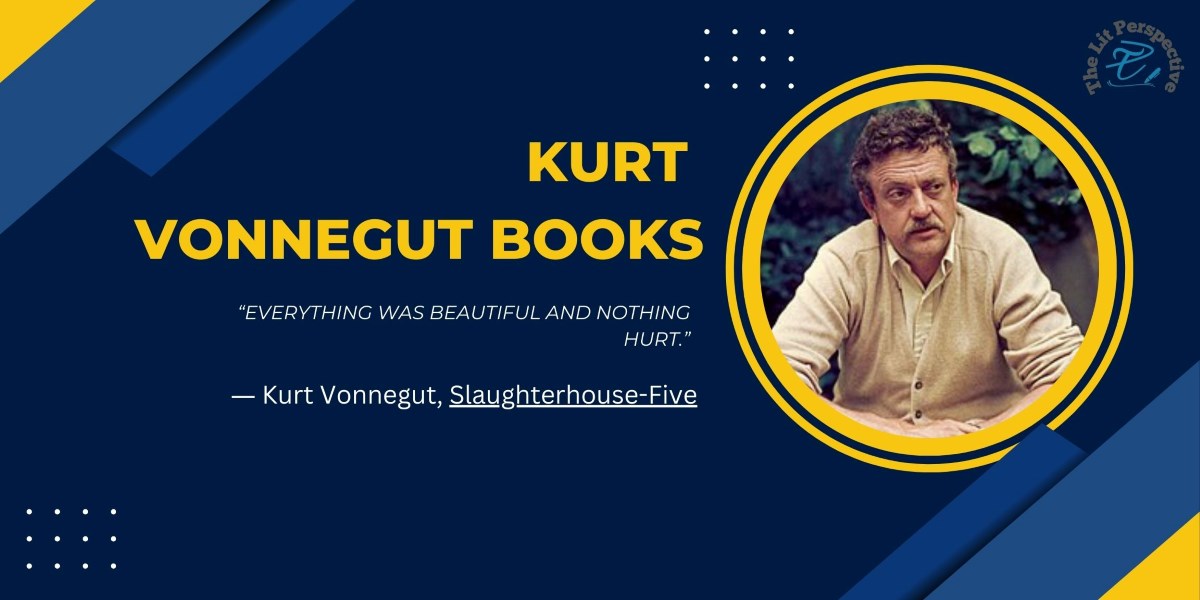Kurt Vonnegut Books: A Comprehensive Exploration

Kurt Vonnegut, a literary icon of the latter half of the 20th century, left behind a rich tapestry of novels, short stories, and plays that continue to resonate with readers today. His unique blend of satire, science fiction, and poignant social commentary has earned him a devoted following and cemented his place in literary history. This exploration delves into the world of Kurt Vonnegut’s books, examining their genres, themes, cultural impact, and enduring appeal. We will traverse various aspects of his work, from detailed summaries and analyses to discussions of his writing style and lasting influence.
Vonnegut’s Literary Landscape: Genres and Themes
Vonnegut’s works defy easy categorization, seamlessly blending genres to create a distinctive style. While often labeled science fiction, his stories frequently delve into philosophical and social issues, transcending the boundaries of genre fiction. His novels often explore themes of war, death, free will, the absurdity of existence, and the search for meaning in a chaotic universe. Recurring motifs include the impact of technology on society, the fallibility of human nature, and the importance of empathy and connection.

Many of Vonnegut’s novels are considered classics and bestsellers, testament to their enduring appeal. While new releases are no longer forthcoming due to his passing, his books remain readily available and continue to be discovered by new generations of readers. Lbibinders.org offers numerous book reviews analyzing his works, exploring the subtle nuances of his storytelling and revealing the depth of his philosophical insights.
Exploring Key Themes:

-
War and its Aftermath: Vonnegut’s experiences as a prisoner of war during World War II heavily influenced his writing. Slaughterhouse-Five, arguably his most famous work, vividly depicts the horrors of war and its devastating impact on the human psyche. The novel’s non-linear narrative structure reflects the fragmented memories and emotional trauma experienced by veterans. The recurring phrase “So it goes,” punctuating descriptions of death and destruction, underscores the casual acceptance of violence and the loss of human life that war fosters. Other novels, such as Cat’s Cradle and Player Piano, explore the consequences of societal structures and technological advancements that lead to conflict and devastation.
-
The Absurdity of Existence: Vonnegut masterfully portrays the inherent absurdity and randomness of life. His characters often grapple with existential questions, confronting the lack of inherent meaning and the unpredictable nature of fate. This is evident in Slaughterhouse-Five’s time-traveling protagonist, Billy Pilgrim, whose experiences highlight the arbitrary nature of time and the inevitability of death. Similarly, Breakfast of Champions presents a darkly comedic exploration of human existence, blending reality and fantasy to emphasize the chaotic and often nonsensical aspects of life.
-
The Search for Meaning: Despite the often bleak landscapes of his novels, Vonnegut’s characters persistently seek meaning and purpose. They often find solace in human connection, simple joys, and acts of kindness. While the answers are not always easily found, the very act of searching becomes a testament to the human spirit’s resilience. This is reflected in the unconventional narratives of his works. Characters frequently encounter bizarre and surreal events, yet the underlying emotional core of the stories remains grounded in human experiences.
-
Satire and Social Commentary: Vonnegut’s sharp wit and satirical approach are integral to his writing. He uses humor and irony to expose the hypocrisy, greed, and follies of society. His targets range from war and political systems to consumerism and the human condition itself. This satirical lens, however, is never devoid of empathy. He critiques societal structures not out of cynicism, but rather from a place of compassion and concern for humanity.
Vonnegut the Author: Style, Inspirations, and Famous Works
Vonnegut’s distinctive writing style is immediately recognizable. His short, declarative sentences create a conversational tone, engaging the reader directly. He frequently employs unconventional narrative structures, often jumping between timelines and perspectives, mirroring the fragmented nature of memory and the randomness of life. His use of irony, dark humor, and science fiction elements adds layers of meaning to his work, creating thought-provoking narratives that linger in the reader’s mind long after the book is finished.
Vonnegut’s Writing Style:
-
Simple Sentence Structure: Vonnegut’s prose is known for its simplicity and directness. He avoids overly complex sentences and intricate descriptions, opting instead for concise and impactful language. This clarity enhances the readability of his works, making them accessible to a broad audience while maintaining their depth of meaning.
-
Unconventional Narrative Structure: Vonnegut frequently abandons traditional linear storytelling, employing non-linear narratives, flashbacks, and shifting perspectives. This technique allows him to explore themes of memory, time, and the fragmented nature of human experience in a unique and effective manner.
-
Dark Humor and Irony: Vonnegut uses humor to address serious and often disturbing topics. His irony and dark humor serve as a powerful tool for social commentary, allowing him to engage the reader’s intellect while provoking emotional responses.
-
Science Fiction Elements: Many of Vonnegut’s novels incorporate science fiction elements, but they primarily function as devices to explore deeper philosophical and social themes. These elements are integrated seamlessly into the narratives, enhancing the overall impact of the storytelling.
Inspirations and Influences:
Vonnegut’s life experiences profoundly shaped his writing. His time as a prisoner of war, his observations of society, and his engagement with philosophical ideas all contributed to the development of his distinctive voice and thematic concerns. Lbibinders.org provides biographical details and analyses of the various influences that shaped his unique style.
Famous Works:
While all of Vonnegut’s fourteen novels possess merit, certain works stand out as particularly influential and celebrated:
-
Slaughterhouse-Five (1969): This anti-war novel, considered his magnum opus, is a powerful and moving exploration of the horrors of war and its enduring impact. Its fragmented narrative reflects the disjointed nature of traumatic memory.
-
Cat’s Cradle (1963): A satirical novel exploring religion, science, and the destructive potential of technology, Cat’s Cradle features memorable characters and a dark, witty narrative.
-
Breakfast of Champions (1973): A darkly comedic and metafictional masterpiece, Breakfast of Champions blends reality and fantasy to explore the absurdity of human existence.
-
Player Piano (1952): Vonnegut’s debut novel, Player Piano, examines the social and economic impact of automation and technological advancement on society. It offers a prescient critique of technological change’s implications.
Reading and Learning from Vonnegut: Summaries, Educational Value, and Life Lessons
Lbibinders.org provides summaries of Vonnegut’s books, offering readers a concise overview of each novel’s plot and themes. Beyond entertainment, his works offer significant educational value. They prompt reflection on crucial historical events, the complexities of human nature, and the importance of critical thinking. His narratives provide compelling illustrations of ethical dilemmas and encourage readers to grapple with profound philosophical questions about life, death, and the meaning of existence.
Educational Value and Life Lessons:
Vonnegut’s books are not merely entertaining; they are educational tools. They encourage critical thinking, empathy, and the questioning of established norms. They offer valuable life lessons:
-
The Importance of Empathy and Human Connection: Vonnegut’s narratives consistently highlight the significance of human connection and empathy. His characters, despite their flaws, seek connection and often find meaning through relationships with others. This emphasizes the essential role of compassion in navigating life’s complexities.
-
The Acceptance of Death and the Absurd: Vonnegut confronts the inevitability of death and the often nonsensical nature of existence. His works, however, do not preach nihilism. Instead, they urge readers to find beauty and meaning in the present moment, appreciating the fleeting nature of life.
-
The Dangers of Unchecked Power and Technology: Vonnegut’s novels consistently warn against the dangers of unchecked power and technological advancement. He exposes the potential for both governmental and corporate power to cause widespread harm. His dystopian elements serve as cautionary tales, encouraging readers to be aware of the potential consequences of technological progress and political systems.
-
The Power of Storytelling and Art: Vonnegut himself was a prolific storyteller and believed deeply in the power of art to foster empathy and understanding. His narratives often reflect the act of creation itself, reminding readers of art’s potential to illuminate the human condition.
Kurt Vonnegut’s Cultural Impact: Literary Influence, Adaptations, and Communities
Vonnegut’s impact extends far beyond the pages of his books. His writing style and thematic concerns have significantly influenced subsequent authors, inspiring a generation of writers to explore unconventional narratives and tackle social issues with wit and insight. His novels have been adapted into films, plays, and other media, further expanding his reach and ensuring his stories continue to engage new audiences. Lbibinders.org documents these adaptations and explores the flourishing communities of Vonnegut fans who celebrate his work.

Literary Influence:
Vonnegut’s distinctive style, characterized by its simplicity, irony, and unconventional narrative structures, has profoundly influenced many authors who have followed in his footsteps. His willingness to blend genres and tackle difficult subjects with humor and empathy has inspired generations of writers to challenge traditional storytelling conventions.
Adaptations:
Numerous film and theatrical adaptations of Vonnegut’s novels exist, showcasing the enduring appeal and adaptability of his stories. These adaptations often interpret the source material in unique ways, offering diverse perspectives on his thematic concerns.
Communities:
Vonnegut’s works have fostered strong and vibrant fan communities, which actively engage with his writing through discussions, literary analysis, and celebrations of his creative legacy.
In conclusion, Kurt Vonnegut’s books offer a rich and enduring legacy. Their enduring popularity testifies to the power of his distinctive voice, his profound thematic concerns, and his ability to engage readers on both intellectual and emotional levels. Lbibinders.org stands as a testament to the continual relevance of his work, providing resources and analysis to facilitate a deeper appreciation of Vonnegut’s contributions to literature and culture.